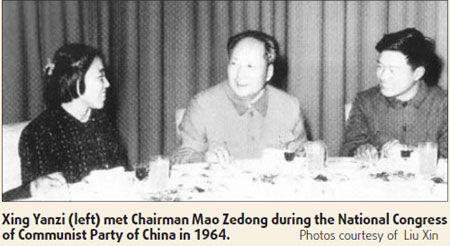
|
CHINA> Highlights
 |
|
Commandos and comrades who cared and shared
(China Daily)
Updated: 2008-12-11 08:00  Xing Yanzi, 68, and Hou Jun, 65, smile as they remember the sweet days of their youth. It was a time of ideals, dreams and passion. It was a time when a young person could make a difference. Both women were role models of the zhiqing generation and became celebrities because they voluntarily moved to the countryside and achieved extraordinary feats to help improve the quality of life of rural people. "I didn't move to a farm in the countryside as the result of propaganda," Xing says with a smile. "But when I saw the poor village and the hungry children, I decided to do something for them." After graduating from high school in 1958, Xing went to Sijiazhuang village, Baodi county, in Hebei province, to look after her grandfather.
All the men in Sijiazhuang had gone to work in cities, leaving children and old people to live in poverty and hunger. The area suffered from floods every year and the setbacks caused by The Great Leap Forward Movement (1958-61) added to the woes. Xing organized a 20-women team to help the local people. In winter, they broke the frozen river surface in order to catch fish and made reed shades to sell for seeds and fertilizer. The villagers called Xing and her team "the Yanzi Commandos" and within three months, they earned 3,600 yuan, a big sum at that time. Through hard work, the Yanzi Commandos improved the quality of soil and increased production. In 1959, the People's Daily published Xing's story and she became a role model for millions of young people. In 1964, Xing met Chairman Mao Zedong during the National Congress of Communist Party of China. "In a welcome dinner, Chairman Mao told me to learn about the spirit of James Watt and (Isaac) Newton and to chase the truth tirelessly," says Xing who sat by Mao. "He noticed my bowl and asked me if he could change it for a bigger one, saying that farmers usually ate with big bowls after heavy work," Xing remembers. "He asked me to eat more and put his dumplings into my bowl." Xing spent all her youth in the village and in 1973, was appointed Party secretary of the Municipal Committee of the CPC (Communist Party of China) of Tianjin. But Xing continued to work in the village over the following decades. Hou Jun was known as "the special girl" during the 1960s. In 1964, Hou graduated from a high school in Beijing and instead of entering university, she went to Doujiaqiao village, in the same county with Xing. "Many urban young people were unemployed during the years and I didn't want to laze away in the city," says Hou. "Most of my classmates from the countryside returned to their hometowns, so why couldn't I follow them?" Many of her friends persuaded her to stay in Beijing and reminded her of the extremely poor conditions she would be facing in the countryside. But Hou was determined to make a difference. "I understood the country was in need at that time, it was especially short of food," says Hou. "The countryside could be a special university for me." Hou was often hungry as she lived in her small earth shack but her lack of food did not curb her enthusiasm and her willingness to help. After heavy farm work, she organized young villagers to study farming techniques and her efforts did not go unnoticed.
In 1963, Hou became as famous as Xing. Premier Zhou Enlai met Hou the following year and the two developed a close friendship until he passed away in 1976. During the years Hou worked in the village, she improved the salina fields and yields increased from less than 100 kg per mu (one hectare equals to 15 mu) to more than 500 kg in 1974. The village not only provided for itself, but could help feed the country. Hou worked in the village for 18 years and kept serving the Baodi people until last year when she retired. Over the past 40 years, Xing and Hou have treasured their experiences. "I didn't ask my children to learn from me, after all we grew up in different ages. But my attitude to life influenced them, and they worked hard and seldom complained," says Xing. "I am happy to see many college graduates going to the countryside now to serve the development of the rural economy. "The countryside today still needs help from the developed areas of the nation. We need to keep the zhiqing spirit." Hou says her grandchildren found stories about her on the Internet and asked more about this time in history. "The 'cultural revolution' changed the nature of the zhiqing movement, but I understood that we had no choice then and never regretted my choice." (China Daily 12/11/2008 page18) |
主站蜘蛛池模板: 欧美日韩在线观看区一二 | 玖草在线资源 | 中文字幕乱码在线观看 | 在线观看国产精品入口 | 久草久在线| 不卡的毛片 | www.91香蕉视频 | 一级毛片视频 | 羞羞一区二区三区四区片 | 欧美一区二区三区gg高清影视 | 欧美三级真做在线观看 | 国产精品视频自拍 | 国产一区二区在线播放 | 一级做a爰片久久毛片美女 一级做a爰片久久毛片免费看 | 中文字幕在线精品 | 全国男人的天堂网 | 久久99精品久久久久久野外 | 亚洲免费视频观看 | 精品久久久久久乐 | 亚洲高清成人欧美动作片 | 成人久久久| 欧美特黄一级高清免费的香蕉 | 91久久国产口精品久久久久 | 国产成人精品男人免费 | 久久精品视频网 | 国产精品1区2区 | 欧美另类老妇 | 欧美另类69xxxxx 视频 | 亚洲精品在线网站 | 99久久国产综合精品2020 | 久草在线新视频 | cao在线| 免费视频一区二区三区四区 | 欧美顶级毛片在线播放小说 | 亚洲欧美在线综合一区二区三区 | 亚洲午夜久久久久国产 | 182福利视频| 久久久综合结合狠狠狠97色 | 草草在线观看视频 | 亚洲乱码一区二区三区国产精品 | 成年人视频在线观看免费 |